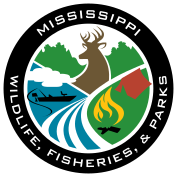
If you have questions about purchasing a license call 1-800-5GO-HUNT.
The Mississippi Museum of Natural Science acts as the state permitting authority for wildlife rehabilitation facilities, scientific collecting and handling of wildlife species, and propagation facilities for non-game species in need of management.
Scientific Collection and Handling Permit Guidelines
Contact Scientific Collections Manager
Anyone collecting animals for scientific or conservation purposes in the State of Mississippi will need to apply for a Scientific Collection/Possession Permit according to Code 49-1-41. Persons collecting certain species for bait or food will not need a scientific collection permit, but these activities may well involve other regulations/licenses.
Collection Application
Collection Report Form
Commercial Captive Propagation
Contact Scientific Collections Manager
The Mississippi Department of Wildlife, Fisheries, and Parks, under the authority of Section 49-5-107, Mississippi Code of 1972, adopted regulations listed in Public Notice M4-3201 pertaining to nongame wildlife deemed to be in need of management.
Species of wildlife deemed to be in need of management can be propagated in captivity for commercial purposes only under a permit issued by MDWFP. Captive propagators are also required to have a valid Mississippi Commercial Fishing License. Species of wildlife considered to be in need of management in Mississippi, along with other conditions and requirements for issuance of a captive propagation permit, are listed in Public Notice M4-3201.
Persons wishing to apply for a commercial captive propagation permit should fill out the permit application form and mail it along with a photocopy of their valid commercial fishing license to the address listed on the bottom of the application.
The Mississippi Department of Wildlife, Fisheries, and Parks under the authority of Section 49-5-107, Mississippi Code of 1972, adopted regulations pertaining to captive-held game species and furbearers (Public Notice 2877) and non-game species in need of management (Public Notice M4-3201).
Contact Collections Manager
Injured or orphaned game or furbearing animals may be kept temporarily in captivity for the purpose of rehabilitation for release into the wild, only under a permit issued by MDWFP. Raptors, migratory birds, and federally protected species require both a state permit issued by MDWFP, and federal permit issued by the U. S. Fish and Wildlife Service.
Persons wishing to apply for a rehabilitation permit should fill out the permit application form and mail it along with all required supporting documents to the address at the stop of the application.
A list of state/federally permitted rehabilitators can be found at: https://wildwatch.org/
Permits will only be issued to persons who comply with all criteria listed in the application. We strongly suggest that persons interested in rehabilitation of wild animals join one of the rehabilitation organizations in the state (listed at the address above). Please note that a wildlife rehabilitation permit does not give the permittee permission to keep native wildlife as pets. All rehabilitation facilities are subject to inspection by MDWFP personnel.